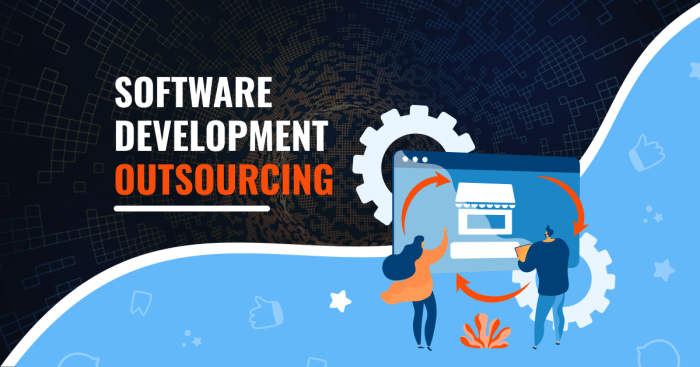Software development outsourcing & support services – In today’s dynamic business environment, leveraging external expertise through software development outsourcing and support services has become a strategic imperative for organizations of all sizes. This comprehensive guide delves into the intricacies of outsourcing, outlining its benefits, challenges, and best practices. We’ll explore various outsourcing models, crucial considerations for selecting a vendor, and the importance of robust support services to ensure long-term success.
Understanding Software Development Outsourcing
Software development outsourcing involves contracting a third-party company or individual to handle all or part of your software development project. This can range from designing and coding to testing and maintenance. It offers a flexible approach to building software, allowing businesses to access specialized skills and resources without the need for significant internal investment in personnel and infrastructure. This strategic move can significantly impact a company’s bottom line and speed to market.
Types of Software Development Outsourcing Models, Software development outsourcing & support services
- Onshore Outsourcing: Engaging a company within your own country. This minimizes time zone differences and communication barriers but may not always offer the most cost-effective solution.
- Nearshore Outsourcing: Partnering with a company in a geographically proximate country. This balances cost savings with manageable communication and time zone differences.
- Offshore Outsourcing: Contracting a company in a distant country. This often offers the most significant cost advantages but requires careful consideration of communication, cultural differences, and potential legal complexities. This often involves dealing with different time zones and requires robust communication strategies.
- Dedicated Teams: Building a dedicated team within an outsourcing company that works exclusively on your projects. This provides greater control and continuity.
- Project-Based Outsourcing: Hiring an outsourcing company for specific projects with defined scopes and timelines. This is ideal for short-term needs or discrete tasks.
Benefits of Software Development Outsourcing
Outsourcing offers a multitude of advantages, including:
- Cost Reduction: Access to lower labor costs, reduced overhead, and potentially lower infrastructure expenses.
- Access to Specialized Skills: Tap into a global talent pool with specialized expertise in niche technologies and programming languages.
- Increased Efficiency and Productivity: Focus internal resources on core competencies while outsourcing non-core functions.
- Faster Time to Market: Leverage the expertise of experienced outsourcing teams to accelerate development cycles.
- Scalability and Flexibility: Easily scale your development resources up or down depending on project needs.
- Improved Quality: Access to standardized processes and quality assurance methodologies employed by reputable outsourcing companies.
Challenges of Software Development Outsourcing
Despite the numerous benefits, outsourcing also presents challenges:
- Communication Barriers: Language differences, cultural nuances, and time zone variations can complicate communication and collaboration.
- Quality Control: Ensuring consistent quality requires robust communication, clearly defined expectations, and effective monitoring.
- Security Risks: Protecting sensitive data and intellectual property requires careful vetting of potential outsourcing partners and implementing robust security measures. Data security and intellectual property protection are paramount.
- Time Zone Differences: Coordinating work across different time zones can be challenging and may require flexible work arrangements.
- Legal and Regulatory Compliance: Navigating different legal and regulatory frameworks can be complex and requires careful planning.
Selecting the Right Software Development Outsourcing Partner
Choosing the right outsourcing partner is critical for project success. Key factors to consider include:

Source: nextbridge.com
- Experience and Expertise: Evaluate the vendor’s track record, portfolio, and expertise in relevant technologies.
- Communication and Collaboration: Assess their communication channels, responsiveness, and willingness to collaborate effectively.
- Security and Data Protection: Verify their security protocols and data protection measures to ensure the confidentiality of your information.
- Pricing and Contract Terms: Carefully review the pricing model, contract terms, and payment schedules.
- Client References and Testimonials: Check client reviews and testimonials to gauge their reputation and client satisfaction.
- Cultural Compatibility: Consider cultural differences and communication styles to ensure smooth collaboration.
Software Development Outsourcing Support Services
Robust support services are crucial for the long-term success of outsourced software projects. These services typically include:
- Maintenance and Updates: Ongoing maintenance, bug fixes, and software updates to ensure optimal performance and security.
- Technical Support: Providing technical assistance to resolve issues and answer questions promptly.
- 24/7 Availability: Ensuring accessibility for urgent issues and round-the-clock support, especially crucial for global businesses.
- Documentation and Knowledge Transfer: Providing comprehensive documentation and knowledge transfer to ensure smooth transitions and internal understanding.
- Project Management and Reporting: Regular progress reports, status updates, and proactive communication to keep clients informed.
Frequently Asked Questions (FAQ)
- Q: How much does software development outsourcing cost? A: The cost varies greatly depending on factors such as project complexity, location of the outsourcing vendor, and the specific services required. It’s crucial to obtain detailed quotes from multiple vendors.
- Q: How do I protect my intellectual property when outsourcing? A: Implement robust non-disclosure agreements (NDAs), clearly define intellectual property ownership in contracts, and choose vendors with strong security protocols.
- Q: How can I ensure the quality of outsourced software development? A: Define clear requirements, establish rigorous quality assurance processes, and monitor progress closely throughout the development lifecycle.
- Q: What are the key risks of software development outsourcing? A: Potential risks include communication barriers, quality control issues, security breaches, and cultural differences. Thorough vendor selection and robust contracts are essential to mitigate these risks.
- Q: How do I choose the right outsourcing model for my needs? A: Consider factors such as budget, project complexity, required expertise, and time zone differences when selecting the most appropriate outsourcing model (onshore, nearshore, offshore).
Conclusion
Software development outsourcing and support services offer significant opportunities for businesses to enhance efficiency, reduce costs, and access specialized skills. By carefully selecting a reputable vendor, establishing clear communication channels, and implementing robust support services, organizations can successfully leverage outsourcing to achieve their software development goals. Remember that proactive planning, thorough due diligence, and continuous monitoring are key to a successful outsourcing partnership.
References
- Gartner (for market research and insights on outsourcing)
- Forbes (for articles and analysis on outsourcing trends)
- Accenture (for outsourcing services and consulting)
Call to Action: Software Development Outsourcing & Support Services
Ready to explore the benefits of software development outsourcing? Contact us today for a free consultation and let us help you find the perfect outsourcing partner to meet your specific needs.
Key Questions Answered
What are the common risks associated with outsourcing software development?
Common risks include communication barriers, intellectual property concerns, quality control issues, and potential vendor lock-in.
How do I choose the right outsourcing partner?
Consider factors like experience, technical expertise, communication skills, security protocols, and client references. Request case studies and conduct thorough due diligence.
What is the typical cost structure for software development outsourcing?

Source: hdwebsoft.com
Costs vary widely depending on factors like project scope, complexity, developer location, and contract terms. Hourly rates, fixed-price contracts, and value-based pricing models are common.
How can I ensure the quality of outsourced software development?
Establish clear quality assurance processes, utilize robust testing methodologies, and maintain open communication with the development team throughout the project lifecycle.
What are the key legal considerations when outsourcing software development?
Key legal considerations include intellectual property rights, data privacy regulations, contract terms, and dispute resolution mechanisms. Legal counsel is advisable.
